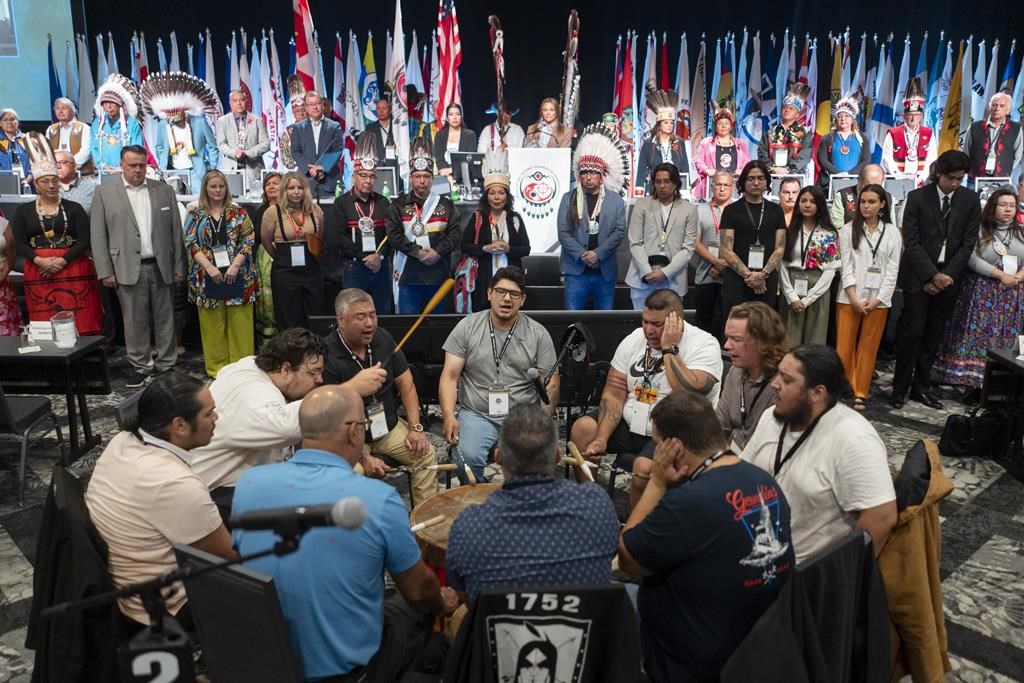The Assembly of First Nations is headed into a third round of voting to choose a new national chief.

Cindy Woodhouse, the current regional chief for Manitoba, continues to lead her closest challenger: David Pratt, vice-chief of the Federation of Sovereign Indigenous Nations.
None of the remaining four hopefuls cleared the 60 per cent threshold for a win on the second ballot, which left Woodhouse with 41.2 per cent of the vote and Pratt with 30.2 per cent.
Dean Sayers, a longtime Batchewana First Nation chief, thanked his supporters after his name was dropped before the third ballot, the results of which were expected at 7:15 p.m. ET.
That leaves just Woodhouse, Pratt and Sheila North, a former grand chief of Manitoba Keewatinowi Okimakanak and a longtime advocate for missing and murdered Indigenous women.
“I remind all of the candidates that are left that that’s who we work for, the future generations,” Sayers said during his concession speech.
“I hope that we are a fortitude, and strengthen how we’re going to work together and unify across this country.”
The election comes months after former national chief RoseAnne Archibald was ousted over the findings of an investigation into complaints from five staff members about her conduct.
The third-party independent review concluded some of Archibald’s behaviour amounted to harassment, and that she had breached confidentiality rules and violated internal policies by retaliating against complainants.
Archibald denied the allegations. Her supporters maintain she was removed from the post for trying to change the organization’s status quo.
Of the 231 chiefs who took part in the special assembly, 71 per cent voted to remove her.
Six candidates were vying replace Archibald and interim national chief Joanna Bernard, including Reginald Bellerose, chair of the Saskatchewan Indian Gaming Authority, and former Alberta regional chief Craig Makinaw.
Both were dropped after bringing up the rear on the first round of voting, which gave Woodhouse 35.1 per cent of the vote, compared with 25.6 per cent for Pratt.
On Tuesday, Woodhouse earned a rousing cheer when she acknowledged Wab Kinew’s election win in her province, where he became Canada’s first First Nations provincial premier last month.
She also called for better First Nations policing, more communication between chiefs and the executive, and the need to lobby Ottawa more aggressively to ensure their concerns are addressed in the next federal budget.
During his speech, Pratt reminded delegates of the “great history” they share in their advocacy, and said if he is elected national chief, “we’re going to shake this country up.”
“We’ve got to stand together and send a message to governments across the country that enough is enough,” Pratt said.
Sayers, a longtime Batchewana First Nation chief, had vowed not to sit around Ottawa waiting for the prime minister to take action. Instead, he promised to be on the ground in communities and to take his cues from the chiefs.
North, a veteran of past AFN leadership campaigns, called for a treaty among First Nations from across the country to show a united front to the federal government that would refuse rules drawn up by outsiders.
According to the assembly’s election procedures, each member nation has one vote, which can be cast either by the chief or by a registered proxy on Wednesday. The winner must receive more than 60 per cent of the vote.
Shortly after the final results are announced, the newly elected national chief is expected to take part in an oath of office ceremony.




Comments